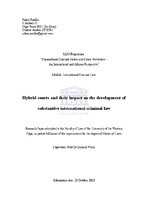Hybrid courts and their impact on the development of substantive international criminal law
Abstract
The aim of this study is to scrutinise, in particular, the legal bases of and decisions taken by various hybrid courts with regards to such consolidating or fragmenting effects on substantive international criminal law. The first section (Chapter 2), it will examine what is to be understood by the notion of a hybrid court. This will be followed by an analysis of the hybrid courts that have been established thus far. Furthermore, the advantages and reasons for which hybrid courts have been established in recent decades will be discussed, especially regarding their potential advantages as a transitional justice instrument. Moreover, disadvantages of hybrid courts and their deficiencies in the past will be addressed. Subsequently, the role of hybrid courts within the international legal system and their utility in the future will be discussed. This will include, on the one hand, the scope of the jurisdiction of hybrid courts in relation to other national and international criminal courts, especially vis-à-vis the ICC. On the other hand, it will be addressed whether hybrid courts will – or should – be established in the future, given the creation of the permanent ICC as well as the shortcomings of hybrid courts in the past. Against this background, the impact of hybrid courts on the further development of
international criminal law will be assessed in the third section of the paper
(Chapter 4). In this regard, the discussion will focus on a representative selection of
hybrid courts, namely the Special Court for Sierra Leone (SCSL), the Extraordinary
Chambers in the Courts of Cambodia (ECCC) and the Special Tribunal for Lebanon
(STL). It will be discussed how their legal bases as well as their jurisprudence relate to the previous state of international criminal law, and whether they constitute adverse diversifications or positive contributions to international criminal law. In a concluding section (Chapter 5), the results of the study will be analysed and possible correlations between the structural elements of hybrid courts and their impact on international criminal law will be discussed. Finally, further questions regarding the use of hybrid courts in the future will be addressed.

